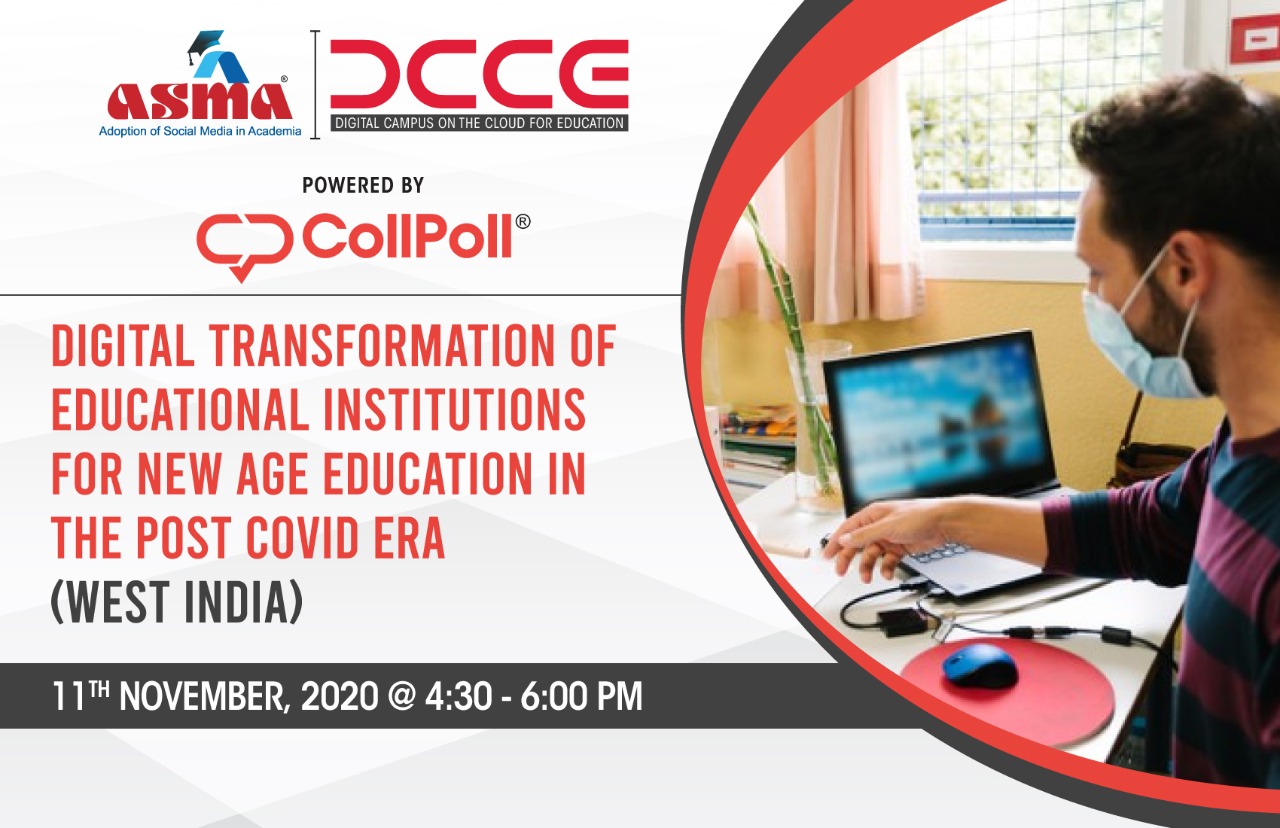Digital Campus on the Cloud for Education powered by CollPoll – West India Chapter
The virtual event was held on under the theme ‘Digital Transformation of Educational Institutions for New Age Education in the Post COVID Era’
The Digital Campus on the Cloud for Education (DCCE) virtual event, powered by CollPoll – West India Chapter was held on 11th November 2020 under the theme ‘Digital Transformation of Educational Institutions for New Age Education in the Post COVID Era’.
The event witnessed the gathering of leaders from the Higher Education and EduTech sectors.
The esteemed panel comprised of Dr. Sharad Mhaiskar, Pro VC, NMIMS University, Mumbai, Dr. Suhrud Neurgaonkar, Director, MIT School of Distance Education, Pune, Dr. Sayalee Gankar, Vice-Chancellor, DY Patil University, Pune and Dr. Ajit Parulekar, Director, Goa Institute of Management, Goa. The panel was moderated by Hemant Sahal, Founder & CEO, Collpoll.
The event also featured an industry presentation by Abhishek Ballabh, Co-founder of EduTech company, ExtraEdge.
To open the session, moderator Hemant Sahal asked Dr. Sayalee Gankar, Vice-Chancellor, DY Patil University, Pune how technology has played a role in managing the new admission cycle over the course of the pandemic.
Dr. Gankar remarked, “It has been difficult for us and other universities to create a platform where we can interact with the students and parents and the role of the faculty has been very important in this. In this case of DY Patil University, we started having our own presence on all social networking platforms; conducting webinars, providing information to students. Also, various apps and methods have been utilised by the admissions team to create a special brand in the minds of students”.
Sharing his thoughts on the way digital can be used to create a unified digital experience for students throughout the education process from admissions to placements, Dr. Suhrud Neurgaonkar, Director, MIT School of Distance Education, Pune pointed out, “Being a school of distance education, we had a period of transition as far as academic and administrative support was concerned. Now the focus has changed to engaging the students through virtual means including through webinars and video lectures. We have had the right set-up to engage students from admissions to placements”.
He added, “While the pandemic impacted physical campuses heavily, luckily we were able to leverage the support given by technology to enhance the learning process”.
Speaking about the key learning over the past months of the pandemic and the best practices regarding the adopting technology, Dr. Sharad Mhaiskar, Pro VC, NMIMS University, Mumbai said, “The pandemic has forced all the higher education institutions to introspect. In many ways, it has given us an opportunity to take a pause, and it has also been an eye-opener for those who have been resisting technology adoption and penetration”.
Mhaiskar added, “With increasing competition in the higher education sector and with aspiring students having more choices, efficiency in internal processes as well as perception building to research, outreach etc, have helped higher education institutions to remain competitive. In the midst of all of this has come the NEP 2020 which has given clear direction to many aspects particularly to technology adoption, infusion and support”.
Commenting on how technology can be leveraged for a more collaborative and experiential learning Dr. Ajit Parulekar, Director, Goa Institute of Management, Goa said, “There are some learning opportunities that you cannot replicate virtually and of course there are some things we can do virtually that are very difficult to do face-to-face, and I think that really is the philosophy on the way you should look at learning management systems and online plus face-to-face learning”.
He continued, “The last thing you would want to do is replicate what you do in a physical classroom online because then you will be bringing in all the negatives you had in face-to-face learning and not making the most of online”.
Dr. Parulekar added, “I just hope that when the students and faculty come back, they don’t feel that we should go back to the way things were. They should say, ‘these are the advantages we saw and we would like to leverage those advantages, and these are the things we know are irreplaceable and we would like to value this”.




